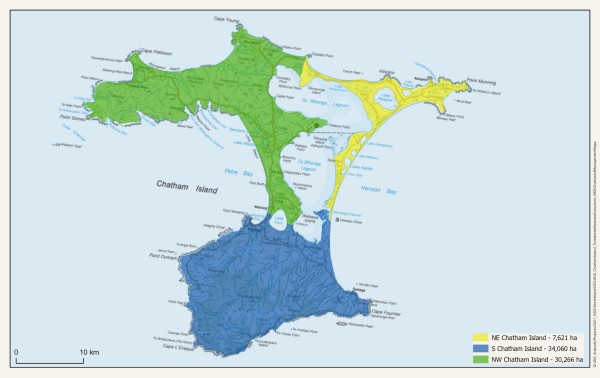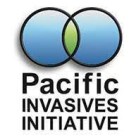
Our plan
Our Predator Free Chathams plan focuses on Rēkohu/Wharekauri/main Chatham. The second stage of the programme - Removing Predators - divides the island up into three geographical areas, or three phases of predator elimination.
The first phase, in the north-east sector of the island (yellow in the map below), is being treated like a pilot. What we learn from removing target predators here will inform our approach for the rest of the island.

Our aim is to have the main Chatham free of our target predators by 2050, and to see this island bursting with life. This means predator control and eradication will happen alongside other restoration initiatives, like plantings, fencing, and biosecurity. As we begin to have safe and suitable habitats, we'll also start reintroducing bird species to areas of the island.
The dates below are indicative and may change as the project goes along. We'll use what we learn, and take advantage of new technologies and knowledge, to adapt to what will work best for our islands.
Initial scoping
Community engagement
Talk with the local community, Moriori and Ngāti Mutunga o Wharekauri, and landowners to understand what matters to them. Use this to help develop potential projects and decide where and how to begin.
Gathering knowledge
Connect with conservation and eradication experts to build up our own expertise. Learn how other eradication projects have worked and what challenges we may face, and understand methods and available tools.
Begin biosecurity planning.
Removing predators
Phase One: North East
Focus on eradication in the North East of Rēkohu/Wharekauri, serving as a pilot project to help build knowledge and inform future work. Draw on what's been learned about how pest species behave and the most effective traps.
Carry out plantings and fencing in key areas to regenerate habitats and ecosystems.
Phase Two: North West and Center
Begin eradication in the North West of Rēkohu/Wharekauri and the center of the island, continuing to build knowledge and expertise. Due to its geography, this area will be divided into two or three sectors.
Continue restoration plantings and fencing to protect these areas. Maintain good biosecurity in eradicated areas.
Scope options for reintroducing birds to areas of the island with both suitable habitat and a lack of predators.
Phase Three: the South
Focus on eradication in the Southern part of Rēkohu/Wharekauri.
Translocations of birds to suitable habitat continues, as does restoration planting and protection.
Biosecurity and maintenance of eradicated areas continues.
Total removal
Post-operational monitoring
Carry out the procedures, biosecurity and monitoring to conclude Rēkohu/Wharekauri is free of our target predator species.
Ongoing biosecurity, monitoring and maintenance is necessary beyond the end of the eradication operations to ensure the predators we've removed don't return.

